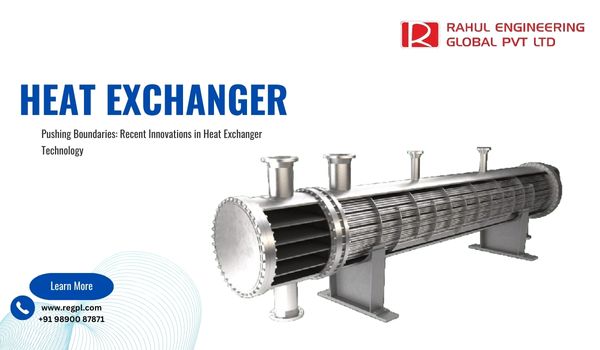
In the ever-evolving landscape of engineering and thermal sciences, heat exchangers continue to play a pivotal role in facilitating energy transfer across various industries. As demands for efficiency, sustainability, and reliability increase, engineers and researchers are constantly pushing the boundaries of heat exchanger technology. In this blog, we'll delve into some of the recent innovations and advancements that are revolutionizing the field, enhancing efficiency, and reliability in diverse applications.
Micro channel Heat Exchangers:
One notable innovation in heat exchanger technology is the emergence of microchannel heat exchangers. These compact devices feature numerous small channels with hydraulic diameters typically less than 1 mm, allowing for efficient heat transfer with minimal fluid volume. Microchannel heat exchangers offer advantages such as reduced size, weight, and refrigerant charge, making them ideal for applications in automotive air conditioning, electronics cooling, and aerospace systems. Recent research focuses on optimizing flow distribution, surface enhancements, and manufacturing techniques to further improve performance and reliability.
Additive Manufacturing (3D Printing):
The advent of additive manufacturing techniques, particularly 3D printing, has revolutionized heat exchanger design and production. Engineers can now create complex geometries with intricate internal passages, tailored to specific heat transfer requirements. Additive manufacturing enables rapid prototyping, customization, and cost-effective production of heat exchangers with enhanced performance and reliability. This technology opens doors to novel designs, such as lattice structures and optimized flow patterns, which maximize heat transfer efficiency while minimizing pressure drop and material usage.
Enhanced Surface Coatings and Materials:
Advancements in surface coatings and materials are driving significant improvements in heat exchanger performance and durability. Nanotechnology-based coatings, such as hydrophobic or hydrophilic surfaces, promote heat transfer enhancement, anti-corrosion properties, and fouling resistance. Additionally, the development of high-performance materials, including advanced alloys, ceramics, and polymers, offers superior thermal conductivity, corrosion resistance, and mechanical strength. These materials extend the lifespan of heat exchangers, reduce maintenance requirements, and enhance overall reliability in harsh operating environments.
Computational Fluid Dynamics (CFD) and Machine Learning:
The integration of computational fluid dynamics (CFD) simulations and machine learning algorithms is revolutionizing heat exchanger design and optimization. Engineers can simulate fluid flow, heat transfer, and thermodynamic performance with unprecedented accuracy, allowing for virtual prototyping and performance prediction. Machine learning algorithms analyze vast datasets to identify optimal designs, operating conditions, and maintenance strategies, leading to significant improvements in efficiency and reliability. This synergistic approach accelerates innovation cycles and enables the development of next-generation heat exchangers tailored to specific applications and requirements.
Modular and Flexible Designs:
In response to evolving industry needs and dynamic operating conditions, heat exchanger manufacturers are increasingly adopting modular and flexible design concepts. Modular heat exchangers consist of standardized components that can be easily configured and assembled to meet diverse application requirements. This approach allows for scalability, customization, and quick deployment, reducing lead times and installation costs. Moreover, flexible designs accommodate variations in operating parameters, fluid properties, and environmental conditions, ensuring optimal performance and reliability across a range of applications.
Conclusion:
The landscape of heat exchanger technology is undergoing rapid transformation, driven by a relentless pursuit of efficiency, sustainability, and reliability. Recent innovations such as microchannel designs, additive manufacturing, advanced coatings, computational modeling, and modular architectures are revolutionizing the field, enabling engineers to tackle complex thermal challenges with unprecedented precision and effectiveness. As these advancements continue to unfold, the future holds promise for even greater leaps in heat exchanger performance, ushering in an era of enhanced energy efficiency and sustainability across industries.
Rahul Engineering Global Pvt. Ltd. specializes in providing innovative and high-quality heat exchangers in pune solutions for various industries. Our state-of-the-art designs and innovative technology ensure optimal thermal performance, efficiency, and reliability. Whether its shell and tube, plate, finned tube, or custom-designed heat exchangers, we deliver tailored solutions to meet our clients' specific requirements. With a commitment to excellence and customer satisfaction, Rahul Engineering Global Pvt. Ltd. is your trusted partner for all your heat exchanger needs.
For any inquiries, collaborations, or questions about our products and services, feel free to reach out to us:
Email: info@recpune.com
Phone: +91 98900 87871
Address: Plot No. 6, Gat No. 627/2/2/6, Pune -410501, Nashik Highway, Kuruli, Chakan, Maharashtra,India
